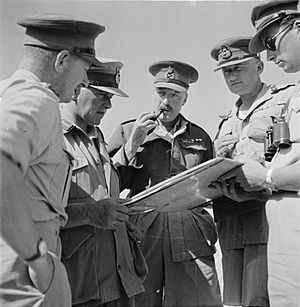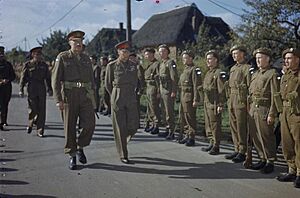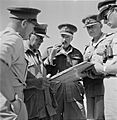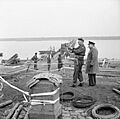Neil Ritchie facts for kids
Quick facts for kids
Sir
Neil Ritchie
|
|
|---|---|
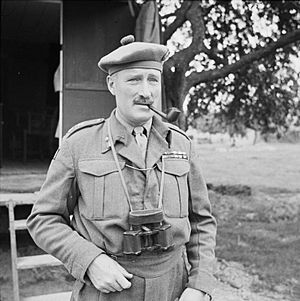
Ritchie in 1944
|
|
| Born | 29 July 1897 British Guiana |
| Died | 11 December 1983 (aged 86) Toronto, Ontario, Canada |
| Allegiance | United Kingdom |
| Service/ |
British Army |
| Years of service | 1914–1951 |
| Rank | General |
| Service number | 9334 |
| Unit | |
| Commands held |
|
| Battles/wars | |
| Awards |
|
| Other work |
|
Sir Neil Methuen Ritchie (born July 29, 1897 – died December 11, 1983) was a high-ranking officer in the British Army. He fought in both the First World War and the Second World War.
During the Second World War, he led the British Eighth Army in North Africa. This was from November 1941 until June 1942. He was removed from command after a tough defeat at the Battle of Gazala.
Ritchie started his military career in 1914 after graduating from the Royal Military College, Sandhurst. He joined the Black Watch (Royal Highlanders) regiment. In World War I, he fought on the Western Front, in Mesopotamia, and in the Sinai and Palestine campaign. He earned several awards for his bravery.
Between the wars, he was part of the Occupation of the Rhineland and led a battalion in Palestine during a local revolt. Even after his setback in North Africa, Ritchie was given another chance. He commanded XII Corps from 1944 until the end of the war in Europe in 1945.
After the war, he continued to serve in important roles. He led British forces in Scotland and the Far East. He retired in 1951 and moved to Canada, where he worked in business.
Contents
Early Life and School
Neil Methuen Ritchie was born on July 29, 1897, in Essequibo, which is now part of Guyana. He was the third child of a Scottish family. His father was a planter.
His family later moved to British Malaya (now Malaysia) when his father's sugar cane business failed. There, his father started a rubber plantation. Neil went to a boarding school called Lancing College and then to the Royal Military College, Sandhurst. This is where officers for the British Army are trained.
World War I Adventures
When the First World War began in August 1914, Ritchie finished his training at Sandhurst. At just 17 years old, he became a second lieutenant in the Black Watch regiment. He was too young to go overseas right away.
He was sent to the Western Front in France in May 1915. He was wounded during the Battle of Loos in September. While recovering, he was promoted to lieutenant.
After healing, Ritchie became a temporary captain in 1916. He joined the 2nd Battalion of the Black Watch in the Middle East. They fought in the Mesopotamian campaign. His unit helped capture Baghdad in March 1917.
He got sick and had to leave the fighting for a while. For his service, he was mentioned in official reports and received the Distinguished Service Order. He was promoted to captain in November 1917.
Ritchie rejoined his battalion in December 1917. They were sent to Palestine to fight there. He earned the Military Cross in 1919 for his brave actions during the Battle of Sharon in September 1918. He was praised for his "coolness, courage and utter disregard of danger."
Between the Big Wars
Ritchie stayed in the army after World War I. His battalion returned to Scotland in 1919. In 1920, they were stationed in Cologne, Germany, as part of the Occupation of the Rhineland.
He worked as an adjutant (a senior assistant) until 1921. He found it hard to live on a captain's pay and thought about leaving the army. However, his friend and future general, Archibald Wavell, told him to stay.
From 1923 to 1927, Ritchie worked at the War Office in London. He also attended the Staff College, Camberley, a special school for army officers, from 1929 to 1930.
He returned to his regiment in British India. He was promoted to major in 1934 and lieutenant colonel in 1936. In 1937, he married Catherine Taylor from Canada. They had a son and a daughter.
In 1938, Ritchie transferred to the King's Own Royal Regiment (Lancaster) and became the commanding officer of its 2nd Battalion. In September, his battalion went to Palestine to help with security during the Arab revolt. He led them until August 1939.
World War II: France and Belgium
Just before the Second World War began in September 1939, Ritchie was promoted to colonel. In December 1939, he became an acting brigadier. He served as the Brigadier General Staff (BGS) for II Corps in France. This corps was part of the British Expeditionary Force (BEF).
His commander, Lieutenant-General Sir Alan Brooke, was very impressed with Ritchie. Brooke noted that Ritchie was calm and confident during the German invasion of Western Europe in May 1940. This helped Brooke focus on leading his troops.
After the evacuation from Dunkirk to England, Ritchie was asked by Brooke to join a new BEF. However, Brooke soon realized that fighting the Germans in France was hopeless. Ritchie was sent back to England. For his service in France and Belgium, he received the Commander of the Order of the British Empire award.
Leading the Eighth Army
Ritchie became a major-general in October 1940. He took command of the 51st (Highland) Infantry Division. This division had been mostly destroyed in France, but it was being rebuilt. Even though Ritchie was not Scottish, he had spent much of his career with the Black Watch, a Scottish regiment. This made him a good choice to lead the division.
In June 1941, Ritchie was sent to the Middle East. He became the Deputy Chief of the General Staff for Middle East Command. In November, he was given his most important command: the British Eighth Army in North Africa. This happened after the previous commander was removed during Operation Crusader.
Ritchie had never commanded a division or corps in battle before. But he was available, and other commanders were busy fighting. His boss, General Claude Auchinleck, helped him at first. The Eighth Army won the battle, forcing German and Italian forces to retreat.
Ritchie commanded the Eighth Army for almost seven months. Auchinleck was happy with his performance in Operation Crusader and kept him in command. Ritchie was described as "vigorous and thorough" and "handsome and authoritative."
However, things changed. In May–June 1942, Ritchie led the Eighth Army in the Battle of Gazala. He struggled to control the large army, especially its armored units. His more experienced officers sometimes ignored his orders. The British forces suffered a major defeat, and the Axis powers captured Tobruk. On June 25, Auchinleck removed Ritchie from command and took over the Eighth Army himself.
A military historian, Michael Carver, later said that Ritchie was a "good, professional, straightforward soldier." He believed Ritchie never fully recovered from a difficult start with Auchinleck. Carver felt Ritchie was too loyal to challenge his superior, which ultimately hurt his command.
Back in the UK
After being removed from the Eighth Army, Ritchie returned to the United Kingdom. He met with General Alan Brooke, who was now the head of the British Army. Brooke decided to give Ritchie another chance.
Brooke believed Ritchie had been promoted too quickly. He told Ritchie to regain his confidence by commanding a division at home. On September 11, 1942, Ritchie was appointed to lead the 52nd (Lowland) Infantry Division. This division was training for mountain warfare in Scotland.
Ritchie proved himself capable again. In November 1943, he was chosen to command XII Corps. He was made a Companion of the Order of the Bath in 1944.
Fighting in Northwest Europe
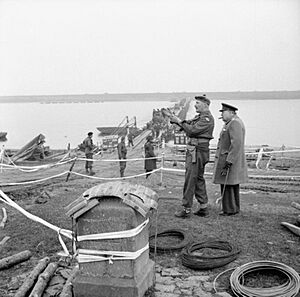
Ritchie's XII Corps was chosen to be part of the invasion of Normandy in June 1944. This was a huge operation to free Europe from German control. His corps was part of the British Second Army, led by Lieutenant-General Miles Dempsey.
Ritchie showed great skill in leading his troops across France. He was good at fast-moving operations and using armored vehicles. His troops quickly crossed the Seine River in August 1944 and reached Ghent in Belgium just days later.
The next year, during Operation Plunder, the crossing of the Rhine River, Ritchie showed excellent planning and coordination. He was tough but fair with his officers. He once told a division commander that if his units didn't reach a certain position by the next day, the commander would be sent home. They reached it.
For his service in Northwest Europe, Ritchie was knighted. He also received several awards from other countries, including the Legion of Merit from the United States and the Legion of Honour from France. He became a full lieutenant-general in October 1945.
Historian Richard Mead said that it's a shame Ritchie is mostly remembered for the Battle of Gazala. Mead noted that Ritchie's overall achievements were significant. He was a victim of being promoted too fast, but he was willing to step down and learn.
After the Wars
After the war, Ritchie remained in the British Army. He became the commander of Scottish Command and Governor of Edinburgh Castle in 1945. In 1947, he became the commander of Far East Land Forces. He was promoted to general in April 1947.
His time in the Far East included the start of the Malayan Emergency, a conflict against communist rebels. In 1949, Ritchie moved to Washington, D.C., to lead the British Army Staff there. He retired from the army on August 29, 1951.
After retiring, Ritchie moved to Canada. He became a director for several companies, including an insurance company. He also chaired the Board of Governors for the Canadian Corps of Commissionaires. He died in Toronto on December 11, 1983, at the age of 86.
Images for kids
See also
 In Spanish: Neil Ritchie para niños
In Spanish: Neil Ritchie para niños
 | Laphonza Butler |
 | Daisy Bates |
 | Elizabeth Piper Ensley |


